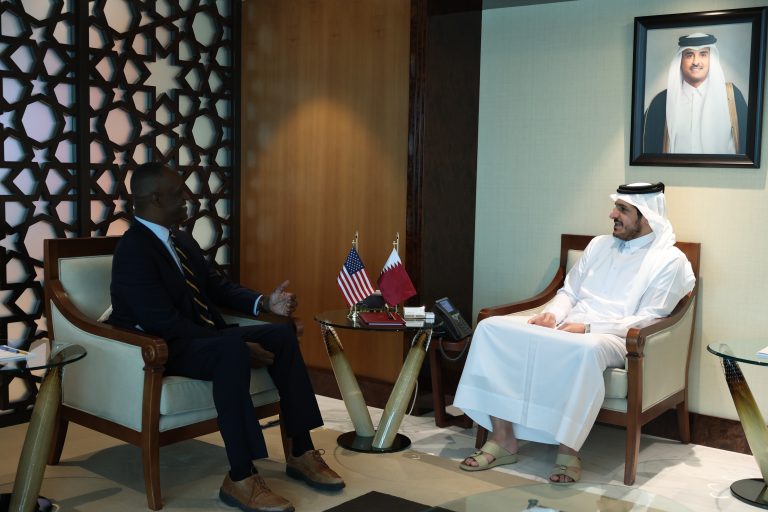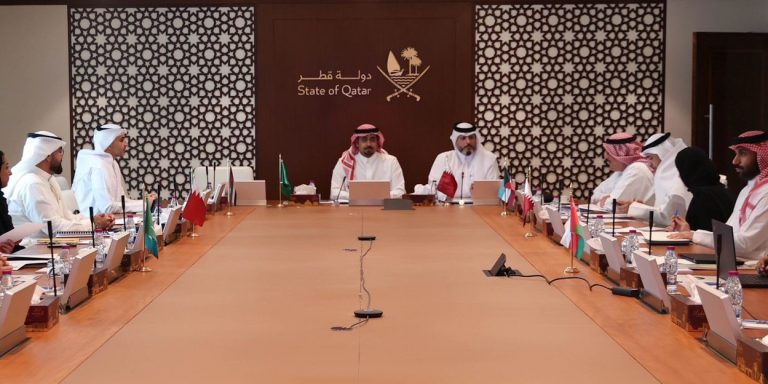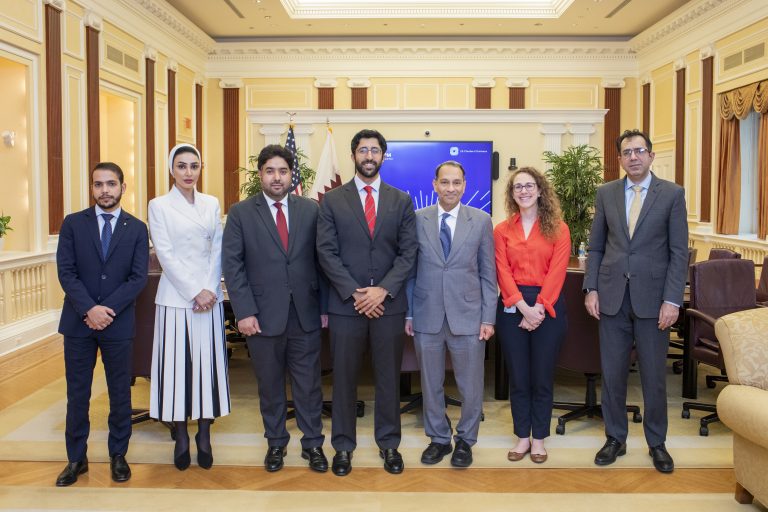• Qatari Islamic banks rank among the largest Islamic banks, both regionally and internationally.
• The assets of Islamic finance in Qatar amounted to about 528 billion QAR, of which the assets of Islamic banks constituted about 86%.
• Qatar FinTech Hub ranked as the second largest investor in the FinTech sector in the MENA region in the first quarter of 2021.
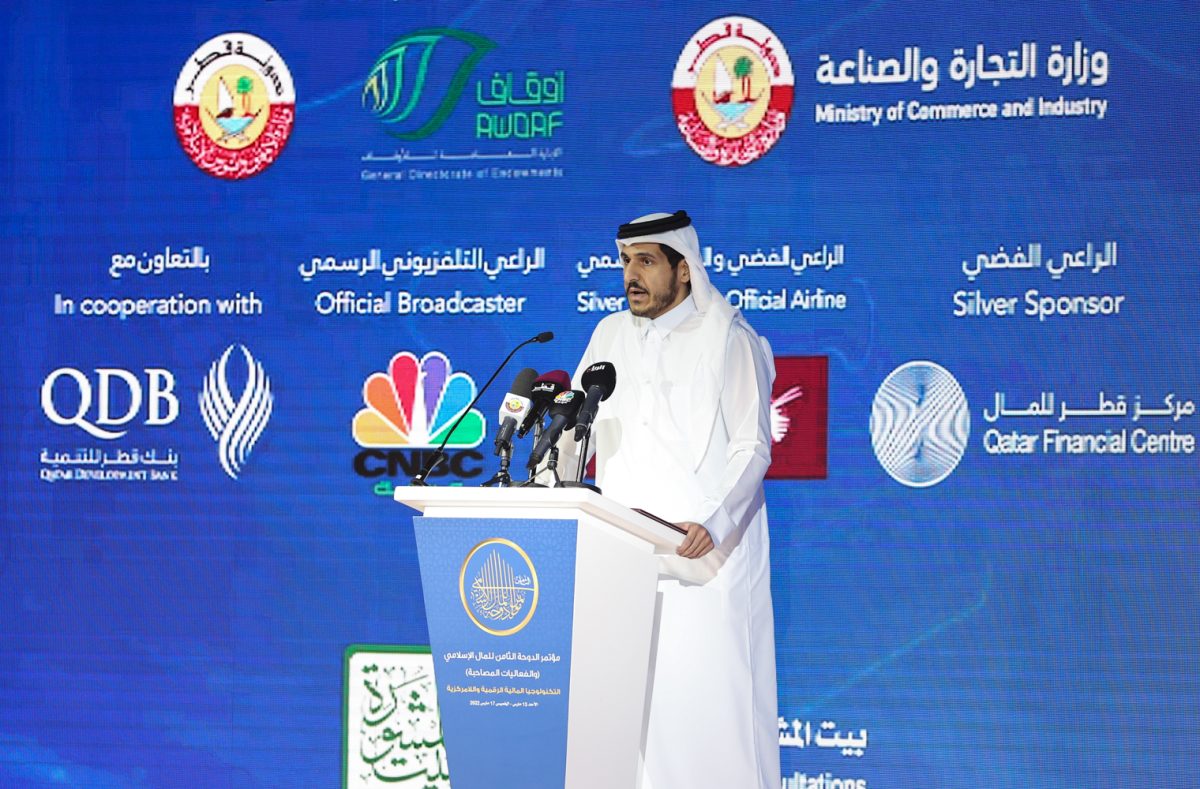
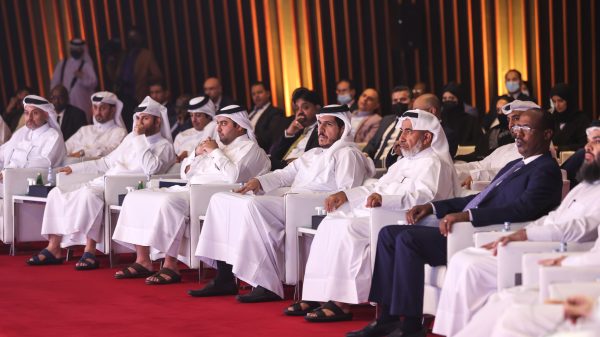
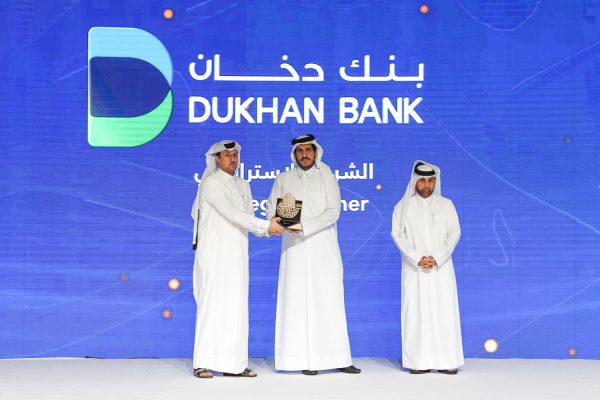
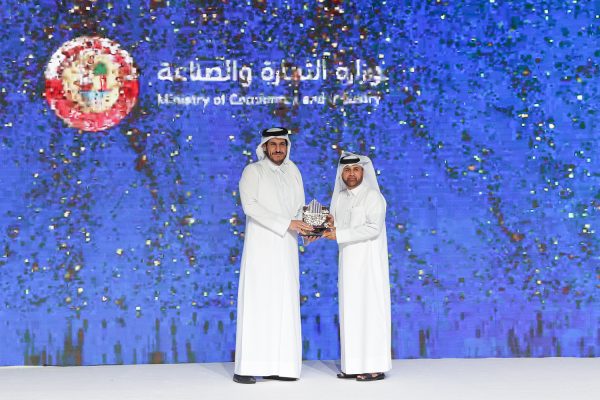
Under the patronage of His Excellency Sheikh Khalid bin Khalifa bin Abdulaziz Al-Thani, Prime Minister and Minister of Interior, His Excellency Sheikh Mohammed bin Hamad bin Qassim Al-Thani, Minister of Commerce and Industry, inaugurated the 8th Doha Islamic Finance Conference, entitled ‘Digital FinTech and Decentralization’, organized by Bait Al-Mashura Financial Consulting Company.
In his opening speech, H.E. the Minister of Commerce and Industry expressed thanks and appreciation to H.E. the Prime Minister and Minister of Interior for his constant keenness to support the financial sector, given that it constitutes a key component of the national economy’s growth.
The Islamic banking sector today represents a key pillar of the financial sector in Qatar, H.E. stressed, pointing out that Qatari Islamic banks ranked among the largest Islamic banks at the regional and international levels.
According to the International Monetary Fund’s definition of major Islamic financial markets, Qatar has been among the top ten countries in the world in the Islamic Finance Index, over the past ten years, H.E. stated, noting in this regard that the assets of Islamic finance in Qatar had amounted to about 528 billion QAR, of which the assets of Islamic banks accounted for about 86%.
H.E. praised the successful Barwa bank – International Bank of Qatar merger that created Dukhan bank, in addition to commending the recent merger between Masraf Al Rayan and Khaleeji Commercial Bank, noting that these operations resulted in the creation of new banking entities that are considered one of the largest Islamic banks in the world.
The pace of digital transformation in countries around the world has seen an unprecedented acceleration during the COVID-19 pandemic, H.E. stated. Governments around the world moved to accelerate the adoption of technological tools to curb the pandemic’s repercussions, and maintain business in various vital sectors in a way that supports the balance and stability of their financial and economic systems.
In this regard, H.E. stressed the importance of the conference as it comprised a significant opportunity to shed light on the approach adopted by Qatar, to quickly adapt to changes and adopt various advanced technological solutions based on artificial intelligence and cloud computing, especially financial technology, according to the top technical standards and regulatory controls.
The Qatari market offers great opportunities for FinTech international companies, especially in light of the projected expenditures allocated for information and communications technology in Qatar, which could reach 9 billion USD by 2024, H.E. added.
The Islamic FinTech market in Qatar was estimated at 850 million USD in 2020, H.E. stated, further pointing out that it was expected to grow to 2 billion USD in 2025.
The said growth comes within the framework of the State’s approach to create an innovation environment, through putting in place the National FinTech Strategy, in addition to the Qatar Financial Center (QFC) programs, especially the ‘Tech Talk’ series, and the QFC Tech Circle, in addition to launching the Qatar FinTech Hub in 2020. The Qatar FinTech Hub ranked as the second largest investor in the FinTech sector in the MENA region in the first quarter of 2021, hence consolidating Qatar’s position as a financial innovation hub, regionally and globally.
At the conclusion of his speech, H.E. the Minister of Commerce and Industry stressed that the growing process of Islamic finance in Qatar, and the continuous efforts to develop it required today active and innovative steps to preserve its achievements in light of global changes. H.E. noted that the conference allowed discussing ways to achieve compatibility between Islamic banks, laws, and requirements of supervisory authorities related to decentralized digital financial technology, in addition to exploring future visions for this sector in light of the general provisions of Islamic Sharia.
For his part, Dr. Khaled bin Ibrahim Al-Sulaiti, Chairman of the Organizing Committee and Vice-Chairman of Bait Al-Mashura, stressed that the 8th Doha Islamic Finance Conference comprised an extension of previous conferences focused on discussing the reality of Islamic finance, its challenges, and opportunities, according to forward-looking, future visions for this important sector.
He said, “At Bait Al-Mashura, we take pride in organizing these events, which we consider part of our duties and our mission towards the Qatari community, by promoting financial culture and teaching money management skills for soundly handling money affairs within the family and society.”
In turn, Mr. Talal Al Khaja, Group Chief Communications Officer, expressed that Dukhan Bank was pleased to have sponsored this conference as of its first edition. Since its inception, the conference has been sponsored and supported financially by Dukhan Bank, whose continuous support for the Doha Islamic Finance Conference stems from its firm belief in the importance of spreading knowledge in rationalizing and guiding the Islamic banking experience, as well as discovering the features of its future, which is projected to be promising, Mr. Khaja said.
Dukhan Bank is fully aware of the important role that digital technology plays in the world of finance, Mr. Khaja further stated. Therefore, when launching its new identity, the bank was keen to make this transformation prominent within its goals and future vision. The bank has witnessed major digitization transformations, and has sought to compete locally and internationally in this field. Recently, it has achieved great international acclaim, and received the Best Use of Machine Learning award for its virtual assistant service, ‘Rashid’, becoming the first bank in the Middle East region to win this award. Mr. Al Khaja also expressed his aspiration that the outcomes of the conference would contribute to enhancing the experience of Islamic banking in Qatar and the world.
For his part, H.E Sheikh Dr. Khalid bin Mohammed bin Ghanem Al-Thani, Director General of the General Department of Endowments at the Ministry of Endowments (Awqaf) and Islamic Affairs (the Diamond sponsor of the conference), stressed that sponsoring this conference stemmed from the General Department of Endowments’ interest in informative events largely affecting the financing and Islamic endowment arena. In this regard, H.E. Sheikh Dr. Khalid bin Mohammed bin Ghanem Al-Thani pointed out the allocation of one of the six major endowment banks to support scientific and cultural development, through various projects to enhance and disseminate scientific knowledge.
H.E. explained that the title of the conference, ‘Digital FinTech and Decentralization’, coupled with the conference’s focus on endowment matters, reflected the critical importance of digital transformation in the endowment field, so as to develop its mechanisms and products. This approach has gone hand-in-hand with the General Department of Endowments’ future vision, knowing that the Department is currently launching the website and a new application for endowments. These tools seek to provide a unique digital experience by making all the Department’s endowment projects and various services available to the public automatically and easily. H.E. expressed his aspirations that the conference outcomes would contribute to strengthening the endowment industry in Qatar and the world.
For his part, Dr. Osama Qais Al-Duraei, Vice Chairman of the Organizing Committee, Managing Director and CEO of Bait al-Mashura Finance Consultations, said that the topics of the Doha Islamic Finance Conference were carefully selected according to a forward-looking vision for the future of Islamic finance in an accelerating and transformative time at all economic levels. The Organizing Committee has been keen to attract senior experts and specialists in the topics and themes of the conference in an effort to present distinguished outputs that enhance the role of Islamic finance and its institutions, Dr. Al-Duraei stated.
He stressed that the message of the Doha Islamic Finance Conference sought supporting the process of Islamic finance and Islamic banking within the State of Qatar and internationally. Moreover, it aims to spread the Islamic economy culture by making the activities of this event more accessible to the public, by allowing in-person attendance pursuant to the instructions issued by the regulatory authorities, in addition to having the option to attend via digital platforms, Dr. Al-Duraei pointed out. Dr. Al-Duraei thanked the supervisory and regulatory authorities for their support and cooperation in facilitating the establishment of this event, marking the most prominent Islamic finance event in Qatar.
It is worth noting that the Doha Islamic Finance Conference, in its eighth edition, addressed four main themes, featuring interventions by a group of scholars and experts in the field of Islamic economics and finance. The first axis discussed the role of supervisory institutions in dealing with decentralized digital financial technology. The second axis touched on Sharia provisions in decentralized digital financial technology, while the third axis touched on the nature and mechanisms of decentralized digital financial products, and the fourth axis previewed the experiences of decentralized digital FinTech through financial institutions, as well as local and international financial technology companies.
The proceedings of the conference also witnessed international participation from governmental bodies, international organizations, as well as financial and academic institutions specializing in the field of economics, money, digital technology, and Islamic finance.
In addition, this year’s edition of the conference featured organizing the Community Financial Culture Week, from March 13 until March 17, 2022, with the aim of spreading financial culture, and providing the knowledge and skills pertaining to the world of digital FinTech.





